- Home
- Steven Becker
Haitian Gold Page 7
Haitian Gold Read online
Page 7
It was near dark when I was led back to the balcony and I smelled the cigar smoke before I reached him. By his side on a small table was a half-empty bottle of rum.
“I’d offer you some, but I prefer to drink alone,” he said.
I ignored the lack of hospitality and opened the burlap sack that I brought, carefully removing one of the ballasts.
“What have you brought? Nothing special there if you ask me.” He drank from the bottle.
I had planned it this way, wanting a bit of drama to keep him interested. I also wanted to prove that we had recovered the treasure from the sea, something that he would need us alive for if we were to do it again. I took the dagger from my belt and struck the coral off the casting. He leaned forward and stared at the dull metal beneath the barnacles.
“Bloody hell, if it ain’t silver,” he said.
I had his attention now. “Recovered legally from a wreck in Cayman waters. We had a deal with the governor, but he got greedy and wanted it all. That is why we fled. Pott can attest to that.”
“Pott can’t attest to shit,” he spat.
I wondered what their history was, but decided this was not the time to pursue it. “I’m here to bring you this as the crown’s share.” I pulled the other casting out and he smiled.
“Now, what have we got here? A pirate with integrity. That’s a rare find. Maybe I will have a drink with you after all.” He yelled for a servant, who brought a glass. The bottle was good enough for the magistrate.
He poured me three fingers and I sipped the amber liquid, almost choking at the harshness of it. He must have seen me because he laughed.
“Not the fine stuff you’re used to, eh? This rock pile gets what it gets.”
I had him now. “We are looking for a partner.” He raised the bottle and drank. “For your protection and a Letter of Marque, we will share anything we find with you.”
“Treasure hunters, are you now? It’d be all fine, except only the governor can give you the Letter.” He paused. “Protection and provisions, though, that I can help you with.”
I was wary of how far this offer could cover us. “The Letter or no deal.”
“You bring back more of that, in something we can broker, if you know what I mean, and I’ll get your Letter.”
That was as good as it was going to get. We would have a safe port close to Haiti, provisions for the ships and, if things worked out, a Letter of Marque.
“What about Pott?” I asked.
“That dog is mine. Call it a surety.” He laughed and drank deeply, draining the bottle.
Chapter Thirteen
We replenished our stores and under a waxing moon set out for Haiti. Although the trip was only sixty miles, it was into the wind and would require multiple tacks, making navigation difficult. Fortunately the mountainous island was visible from far at sea. By leaving Great Inagua in the dead of night we expected to arrive off the coast in time to anchor before sunset the next day.
Mason and I talked as he steered. I watched the hourglass, calling the tack whenever it expired. By tracking the time and staying forty-five degrees to our course with each tack, we could stay close to a straight course. Of course the wind and current would alter our attempt at dead reckoning, but hopefully get us within sight of the river. Between maneuvers we worked out who should go ashore and what to do about the ship while we were gone. We had left the Panther in Great Inagua with Phillip in charge, not needing both ships. Under the watchful and greedy eyes of the magistrate, I expected her safe. The crew had orders to finish the changes to her sails and we had left several of the men skilled in carpentry to complete the repairs from the frigate’s attack.
Now the decision needed to be made about who would make up the shore party. I would go, of course, along with Rhames, Swift, Red, Blue and Lucy. We had already traveled many miles together and knew how each would act if things went badly. Pierre had asked to take two men, making us eight. That was the limit the longboat could safely carry. Mason would stay with the ship and we had set up a system of signals from the Chinese flares I had found aboard the pirate ship. He would patrol off the coast and wait for us to set off the rockets.
Shayla came on deck, leaving an uncomfortable space between us.
“What are your plans, then?” she asked.
Mason made an excuse to check something forward and left us alone at the helm. “Tomorrow we should be off the coast. I’d like to land a shore party before dark and get on with it.”
“You’ve not said two words to me since we left Inagua. If you don’t want me around, just say the word. I’m not the kind to waste time,” she said and inched further away.
I had been avoiding her, knowing she would ask if she was included in the shore party. “Your French will be helpful,” I offered to judge her intentions. Rhames and I had fought about it. Lucy, we both knew, could take care of herself. I had no idea how well Shayla would do, but without her to translate we had little chance of success.
She turned to me. “You don’t seem pleased about it.”
“And I’m not. There’s no telling what awaits us on that island. Surely you have heard the rumors about their voodoo. And …”
She ignored my concerns and moved closer. “I’d very much like an adventure.”
Mason returned and I offered to stand watch until dawn. He gratefully accepted and went below, leaving Shayla and me together under a star-swept sky.
Around dawn the wind picked up. The helm pulled to the weather and I sent the men into the rigging to reef the sails. The ride, so pleasant only an hour before, had turned into a struggle to keep the ship on course. Mason must have sensed the change and took over the wheel.
“From the look of the sky, we’ve got a storm on the way,” he said and called an order to the men.
The sun crept above the horizon, lighting the clouds a brilliant red, and I feared the worst. The sky was ominous and the wind had already started to prove the point. Before long the first drops of rain hit the deck and the storm came on in full, the raindrops so fat and hard that they reduced visibility to a few feet. With every wave a stream of water came aboard the ship, drenching us. I couldn’t help but notice how cold the rain felt compared to the seawater and I began to shiver.
Mason looked to be enjoying himself, the muscles on his arms bulging and rainwater streaming from his hair and beard. Our course never wavered. I did the best I could to assist him with the traverse board and keep watch. It was one of the men in the rigging that first spotted land and I climbed up to see for myself. We were still a ways off, but the mountains, their tops covered with the low clouds from the storm, were visible and the shoreline became more defined as we crept closer. A breath at a time, the wind died down and the storm passed, leaving us becalmed. We drifted, praying for the sun to dry us out and take the chill from our bones.
The clouds stayed thick and did nothing for our moods. Wet and cold, we moved slowly toward the coast. I called for Pierre and Shayla.
“Can you tell where we are?” I asked.
“He says the clouds make it difficult to see the peaks.”
I followed his gaze as he studied the land. Just as I was about to turn away I saw a mast on the horizon.
“Sail!” I called up to the men in the rigging and put the glass to my eye. “She’s at least a frigate and flying Spanish colors.”
Pierre held out his hand and I gave him the glass. He put it to his eye and watched the approaching ship for a long time, then scanned the shore to the west. I followed his gaze to the east and waited for Shayla to translate.
“We are too far to the east.” she said.
Mason reacted before I could speak and spun the wheel hard to starboard. The last place we needed to be with this much treasure, a good portion looted from Spanish ships, was here, with the eastern half of the island in their control. I called the ship to battle stations and Rhames unlocked the weapons locker.
“Can we outrun them or will it be a fight?” he asked,
the question directed more toward Mason than me.
Mason took a long time to answer. “Unless we can reach Haitian waters before she catches us, it’ll be a fight.” He paused. “Even then there’s no guarantee she will stop. She’s a man-o’-war by the look of her,” he added.
“What can we do to get more speed?” I asked.
“She’s on a broad reach and moving well.” He turned the wheel to port and pointed the bow toward land. The men adjusted the sails and I could feel our speed increase. “That’ll give us an edge, if we don’t hit a reef or those hills don’t steal the wind from us.”
I saw his plan and knew it was the only way. We needed to skirt the coast and hope the mountainous terrain didn’t block the wind near shore. The land was coming up fast.
Pierre pointed to the west. “There is the border,” he yelled. “To the right of the point.”
We were headed to a small point jutting out from the mainland. Suddenly the water exploded behind us. A range shot had been fired from the Spanish ship and fell only a few hundred feet off our stern.
“You’ve got to get more out of her,” I yelled to Mason and ran to the rigging.
“This is all we’ve got,” he called back. “Better get the cannon sighted.”
The sails were humming, taut with the wind. I released my hold on the rope ladder and went from gun to gun. Rhames was already working the elevation screws and there was no need for my help. I went back to the rigging and climbed to the top of the mainmast, hoping to find a way out.
Water splashed the deck as the next shot fell only fifty feet short. They would soon have us in range. I turned to the land and studied the coast. What looked like a river mouth was just a mile past the point. From my vantage point I could see no breaking water indicating a reef. I scurried down to the deck, sliding on the still-wet boards, but gained my feet and reached the helm.
The spot was almost invisible from this angle, and I pointed to the coast. “There is a river mouth or inlet there. If we can reach it, we can turn and protect ourselves.”
Mason turned a few degrees and we pushed for the spot. The rounds were coming closer, but as yet we were not hit. We were stern to her bow and she fired her bow chasers, surely smaller guns than her port and starboard. We were too far away for our carronades to return fire. We needed the tactical advantage of the river mouth. I looked back and saw the man-o’-war adjust her course to follow us. The gap held and at least for the moment, she stopped firing.
“Go right for the eastern edge. We can jibe and fire from our starboard guns.” I went to help Rhames site the guns for their maximum effective range. We could make out the details of the shore now, and I looked back at the Spanish ship. She had turned slightly and just as I was about to call out, she rocked violently and released a broadside. Their range was right on and several balls crashed through the deck. I ordered men to man the pumps and went forward. There was no point in dropping the lead. We were either going to make it or become cannon fodder.
Slowly we entered the inlet and I looked toward land, surprised to see a large bay open before us. Mason called the order to jibe and drop sail. The Caiman coasted to a stop in the center of the narrow pass. I gauged the approach of the man-o’-war. She was pointed right toward us, her guns ineffective at this angle. With the narrow profile she showed, it would take a well-placed shot to reach her, but this might be our only chance.
Rhames ran from gun to gun making final adjustments, then waited impatiently beside me for the Spanish ship to come into range.
“Fire!” he yelled.
The Caiman rocked from the recoil of the guns, and the smoke obscured our view. “Reload,” I yelled.
Finally the smoke dissipated and we could see the ship now. Our broadside had been effective, taking several sails down, and the bowsprit was dragging in the water. Her crew would need to make repairs before they followed us.
“We’re in Haitian waters now, but this is a bad place,” Pierre said. “It is too easy to be bottled up in this bay. We need to head west toward the river. From there we can take the longboat to the palace.”
Chapter Fourteen
The lights, visible first as a glow in the sky and upon arrival displaying the size of the palace, made me wonder at the folly of the mission. Pierre had said it was opulent and a testament to the evil regime of Henri, and now, sitting in the bush, I could see it truly was. Every approach was exposed and we were forced to wait until dark to enter. The native Haitian was a different man here: he stood tall and spoke with authority. I had come not only to trust him, but also to like him, though I couldn’t help but notice the looks that he and Shayla exchanged—as if they had some secret between them.
Pierre had wanted to go alone, but I had forced the issue. Without him we had no chance at the treasure. Blue was with us for his tracking abilities. If something happened to Pierre, he could get us back. It was two days since we’d left the Caiman to Mason with orders to stand off the coast. The wind was favorable, allowing us to rig a lateen sail in the longboat. We had made good time traveling west along the coast and found the river that Pierre said led to the palace called Sans-Souci. Along with Blue, Rhames, Shayla and I had left the others several miles downriver and followed Pierre across the easy terrain until we were in sight of the palace.
After catching our breath, we left the cover of the road, staying in the shadows of a short wall about a hundred feet from the main structure.
We were about to cross to the gate when Blue came forward.
“I wait here, Mr. Nick,” he said.
I nodded my ascent knowing his distaste for buildings. He would also guard our exit. Pierre led the rest of us toward the rear of the palace, arriving undetected at what appeared to be a service gate, where he called out in French. A few minutes later a rotund man with an apron appeared from the shadows.
Pierre engaged the man in conversation. I couldn’t understand the words and looked at Shayla, but she was intent on listening. By the time it was over, the tone of the man changed. He opened the iron gate and allowed us entry to the kitchens. Pierre led us through the labyrinth of ovens, work areas and storage areas to a narrow hallway.
Carefully we followed the corridor until we reached a staircase.
“You must wait here,” Pierre said.
Rhames and I looked at each other, not wanting to be left alone in the confines of the palace.
Pierre noticed our distress. “It is beyond that door that he keeps his women. It is here that the map is hidden. I must go alone.”
“Hurry,” I said and watched him fade into the shadows. A minute later I heard whispers and the rusty hinges of a door opening. Rhames and I waited in silence, peering into the shadows and listening for any sign of pursuit. Finally we heard the hinges creak again and we pushed ourselves flat against the wall.
Pierre emerged from the darkness and came toward us looking defeated. He whispered something to Shayla.
“Shit,” Rhames cursed.
“What of the map?” I asked.
She spoke to him and he held out a rolled-up parchment. He spoke again. “It seems Henri is dead, and the new leader is one of his old generals: Jean-Jean,” Shayla translated.
Pierre spat at the mention of the name and, with a sense of urgency, led the way back through the kitchens.
Rhames and I looked at each other, neither of us happy at the development, but we knew we had no choice. So far we had been lucky and only seen a few cooks. From everything Pierre had told us about Henri’s reign, he was a brutal leader, taxing heavily and indenturing much of the population. From his reaction to the new leader’s name, nothing had changed. The servants and slaves would not turn us in. An argument, though, might alert a guard.
Pierre led us away from the palace. His stature was different and he had become withdrawn. Shayla stayed close to him, the pair whispering back and forth in French, convincing me further that something was wrong. Once we were out of sight, we stopped to catch our breath. Before I c
ould ask her what they had been talking about, a shot came from behind us and we heard a man call out orders. Despite the language barrier I knew we had been discovered.
An hour later we were back at the river. “Hurry, get the boat ready,” I yelled ahead of us. The crew jumped up and in minutes had the longboat in the water. We pulled hard on the oars and with the current in our favor were soon several miles downstream, where we stopped.
“They will be on foot. We have lost them for now,” Blue said and drank from the stream.
“Let’s have a look at the map,” I said. Rhames and Red moved beside me. Pierre unrolled the parchment and held it the moonlight. It was not a map at all, but a plan of a building. The outline and what looked like rooms were clearly shown. “What is this?” I asked.
Shayla again translated: “The Citadel. The gold is here.” He pointed to the plan. “Henri was rumored to have built a secret chamber under the fortress where he hid the gold and then killed anyone that worked on it. He stole this from the builders and hid it with the women before he was arrested.”
We climbed back into the longboat and were soon floating downriver again. Once in the main current, I checked behind for any pursuit. Satisfied we were alone, I turned to Shayla. “He says it is a fortress—then how do we get in?” I asked.
“I suspect it has something to do with that plan,” Shayla said, and spoke to him.
He turned away, apparently not ready to reveal the fortresses secret. Or maybe he was just as tired of having to speak through Shayla as I was. I could feel Rhames tense in front of me, but it was too dark and awkward in the boat to look at the paper. The first rays of light were in the sky now and we followed the river back toward the coast, making twice the time we had the day before with the current in our favor. Near the coast we reached a fork, where Pierre had us turn upstream into the new tributary. This was a slower and wider section of the river and we pulled against the flow through the morning, taking turns at the oars.

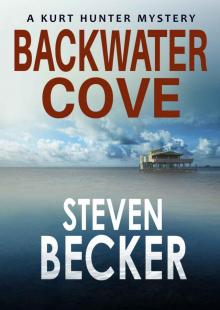 Backwater Cove
Backwater Cove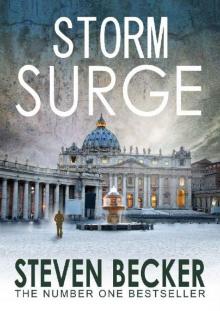 Storm Surge: A Fast Paced International Adventure Thriller (Storm Thriller Series Book 3)
Storm Surge: A Fast Paced International Adventure Thriller (Storm Thriller Series Book 3)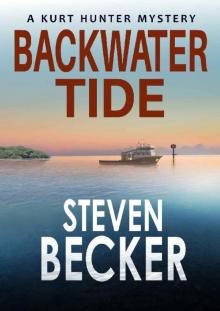 Backwater Tide
Backwater Tide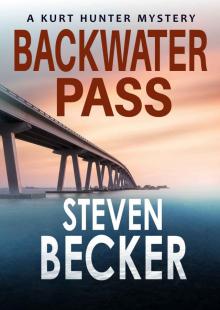 Backwater Pass
Backwater Pass Backwater Flats
Backwater Flats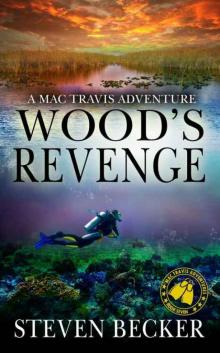 Wood's Revenge
Wood's Revenge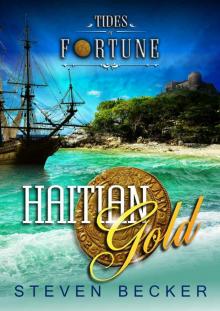 Haitian Gold
Haitian Gold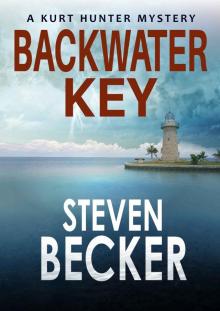 Backwater Key
Backwater Key Wood's Tempest
Wood's Tempest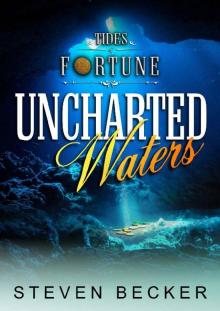 Uncharted Waters
Uncharted Waters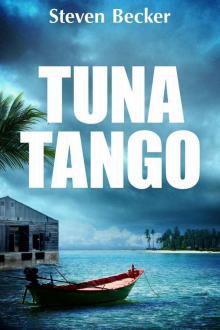 Tuna Tango
Tuna Tango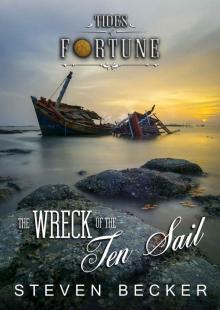 The Wreck of the Ten Sail
The Wreck of the Ten Sail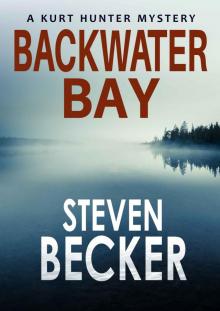 Backwater Bay (Kurt Hunter Mysteries Book 1)
Backwater Bay (Kurt Hunter Mysteries Book 1) Storm Clouds
Storm Clouds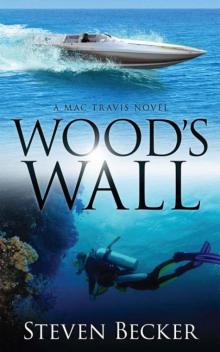 Wood's Wall
Wood's Wall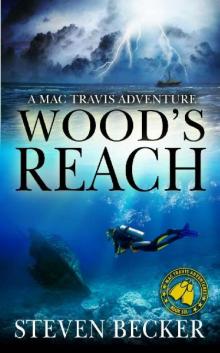 Wood's Reach
Wood's Reach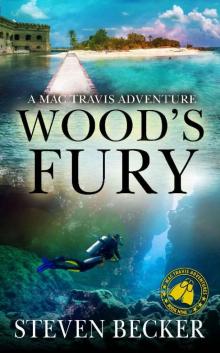 Wood's Fury
Wood's Fury Storm Rising
Storm Rising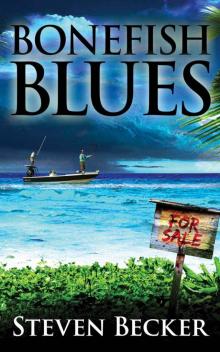 Bonefish Blues
Bonefish Blues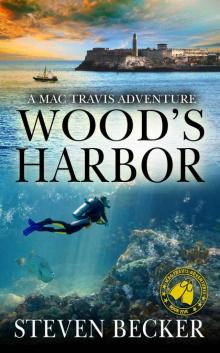 Wood's Harbor: Action & Sea Adventure in the Florida Keys (Mac Travis Adventures Book 5)
Wood's Harbor: Action & Sea Adventure in the Florida Keys (Mac Travis Adventures Book 5)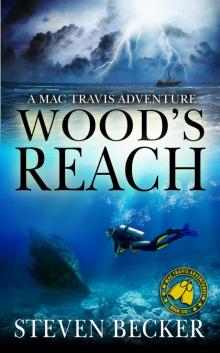 Wood's Reach: Action & Sea Adventure in the Florida Keys (Mac Travis Adventures Book 6)
Wood's Reach: Action & Sea Adventure in the Florida Keys (Mac Travis Adventures Book 6)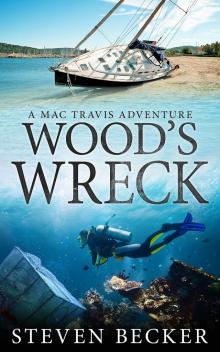 Wood's Wreck
Wood's Wreck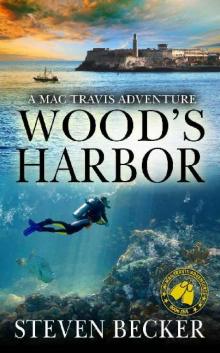 Wood's Harbor
Wood's Harbor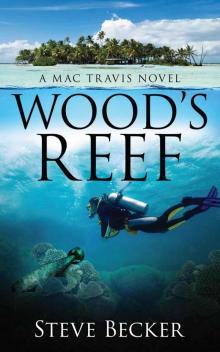 Wood's Reef
Wood's Reef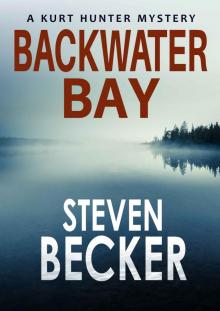 Backwater Bay
Backwater Bay